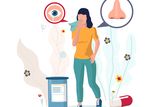15 things you didn't know about arthritis
Knowing as much as possible about your arthritis can help you take back control of your life. We spoke to Arthritis Ireland and Dr Emma MacDermott, paediatric rheumatologist, to bring you the facts
You can and should exercise with arthritis
Arthritis is an inflammation of the joints which causes pain and immobility ranging from mild to severe, and, even though it affects more than 900,000 people in this country, we don't have a cure for it and can't prevent it. However, by understanding the condition and the healthy lifestyle practices which can help control or even alleviate some symptoms, respecting your medication regime can help. According to the experts, there are also things that you can do to break the cycle of pain and fatigue which is a hallmark of the condition - healthy eating, physical exercise and educating yourself can all help.
1 Children get arthritis
"The most common reaction we receive as paediatric rheumatologists is that people didn't know the disease exists in children," says Dr Emma MacDermott, a paediatric rheumatologist, based in Crumlin hospital.
Arthritis affects over 1,000 children in Ireland, yet when we hear the word 'arthritis', we often think of adults, not children and teenagers. Juvenile idiopathic arthritis (JIA) or juvenile arthritis (JA) is the name for a number of forms of arthritis in children and teenagers. Juvenile means that the arthritis began before a child was 16-years-old, idiopathic means there is no single cause and arthritis means that one or more of your child's joints are inflamed - that is, they are swollen, painful, stiff and your child may not be able to move them as far as normal. Every year about 1 in 10,000 children in Ireland is diagnosed with the condition, making it almost as common as childhood diabetes. It can begin at any age, although it most commonly shows up in younger children. It can develop in boys or girls, although most types are more common in girls.
2 There's no one particular diet which will help
"I always say to patients that we have forms of arthritis which are associated with gastro-intestinal problems such as coeliac disease," says Dr MacDermott. Coeliacs can have joint pain, and, in this case, maintaining a strict coeliac diet can help. However, in general, she says, no particular diet will help. "People will say don't eat tomatoes, oranges or potatoes, but there's no evidence to show that including or excluding any particular food from the diet will help improve the condition." However, she advises, maintaining a healthy weight and eating a balanced diet can impact in this way on your condition: "For example if you're overweight, this increases the stress on your joints and if you're underweight you will become tired more easily and you may not be as able to participate fully in your programme of physiotherapy and exercise."
3 Cracking knuckles does not lead to arthritis in later life
There's no conclusive evidence that cracking knuckles and joints can cause arthritis later in life, but says Dr MacDermott: "We still advise caution about indulging in this habit." There is also no evidence substantiating the traditional wisdom that failing to dry your hands, or not drying your hair will respectively help cause arthritis in the hands or neck.
4 Doesn't just affect the elderly
Although many people associate the condition with ageing, it's not a disease that is just linked with ageing or overuse of the muscles, says Dr MacDermott - in fact, she points out, the average age of diagnosis for rheumatoid arthritis is just 35. "All arthritis should be managed early and aggressively to minimise damage to bones and joints and some of the secondary effects that can occur such as cardiac disease," she advises. Early management can change the progress of the disease and help prevent long-term damage. If you have persistent joint pain or swelling, see your doctor.
5 Don't expect sympathy!
Because people with arthritis often look just like anyone else, the full impact of the condition on the body tends to be extremely under-recognised and under-appreciated, even though nearly one million people in Ireland are living with it. "If a person looks well, people don't tend to recognise the impact of the condition on them," says Dr MacDermott.
"For children in particular this can have a huge effect on their psychological and social development, because it means that they're often expected to perform better in physical activities than they may be capable of doing. "However, when arthritis is comprehensively well-managed, patients can enjoy full productive participation in school, sports and life in general."
6 Moving to a hot, dry climate won't automatically improve the condition
Although there's plenty of anecdotal evidence about the relationship between arthritis symptoms and weather, it's believed that that this is related to the fact that the body is simply registering changes in air pressure - and not predicting the arrival of rain. "We think it is the change in air pressure before a shower that people feel - not necessarily the rain itself," says Dr MacDermott, who emphasises that there is no conclusive evidence to support the connection between weather and the severity of arthritis.
7 Arthritis doesn't only cause problems for the joints
It can also adversely affect the eyes lungs, skin, heart and blood vessels. "Some forms of arthritis can cause problems in organs such as the eyes or lung or heart or blood vessels because these particular conditions are caused by inflammation. "This inflammation caused by an over-active immune system," says Dr MacDermott. Examples include rheumatoid arthritis and many of the childhood forms of arthritis.
8 Arthritis is the single biggest cause of disability in Ireland
It accounts for one in three GP visits and, as part of the musculoskeletal group of diseases (MSDs), costs the exchequer more than €700m every year in lost working hours and forced retirements, according to Arthritis Ireland. There are many types of arthritis, but the most common forms in adults are osteoarthritis (OA) and rheumatoid arthritis (RA). "With improved treatment and therapies the negative impact of arthritis on everyday life can be reduced," says Dr MacDermott.
9 Currently, no cure exists for arthritis
International and local research is however, bringing us closer to this goal. "We have one focused rheumatology research department already established in University College Dublin, while a second is soon to be announced for Trinity College," Dr MacDermott observes.
10 Yes You Can Help Yourself
Arthritis can change your life for the worse, but there's a lot you can do about it. "While arthritis can be a difficult and chronic diagnosis, working with a multi-disciplinary team, being compliant with your medication and developing a lifestyle and medication programme that works for you can allow you to lead a full healthy and productive life," says Dr MacDermott. Arthritis Irelands run various self-management programmes and offer a helpline service (1890 252 846). Visit Arthritisireland.ie for more details.
11 You CAN and SHOULD exercise with arthritis
Some of the most common myths in relation to arthritis are that exercise will increase pain and cause damage to the joints. In fact, counsels Arthritis Ireland, staying physically active is the most important thing that YOU can do to help your arthritis. "Physical activity is proven to be an important part of managing your arthritis. As well as reducing the pain and inflammation of arthritis, being active and exercising regularly improves joint support and lubrication, helps with weight control and has many other health benefits, including lowering blood pressure and stroke risk. "
Moving truly is the best medicine - and there isn't just one particular exercise or activity that is recommended for all people with arthritis. Discuss your choices with your doctor or therapist, who will help you select the activity most appropriate to your situation. However, choose an activity that you enjoy and that is convenient for you to do.
12 Arthritis, particularly auto-immune arthritis, tends to affect women more than men
According to Arthritis Ireland, this holds true both in adults and children, although a few forms of arthritis such as Ankylosing Spondylitis are more common in young men. Currrently, for example, about 45,000 people in Ireland are living with rheumatoid arthritis - three out of four diagnoses are for women and more than 2,000 new casese are diagnosed every year. Three out of four patients diagnosed are of working age.
13 Being overweight raises your risk of arthritis.
Excess body weight can increase wear and tear on weight-bearing joints such as your knees, feet and hips. This increases your chances of developing osteoarthritis, the most common type of arthritis.
Being overweight can also increase your risk of other types of arthritis.
Losing even a small amount of weight can reduce stress on the joints and help you avoid surgery. A study from the UK, by Dr Stephen Messier, shows that for each pound of body weight lost, there is a four-pound reduction in knee joint stress among overweight and obese people.
14 A high proportion of people living with arthritis have at least one other disease or condition
Nearly three in 10 people (29pc) with arthritis will also have heart disease. A similar number may also suffer from diabetes (32pc). There are also links with depression (22pc), high-cholesterol (20pc), high blood pressure (19pc) and many others. According to Arthritis Ireland, no one can say exactly why people with the diagnosis have at least one other disease or condition. However, research suggests that arthritis and other chronic conditions share some risk factors, such as age or obesity.Arthritis also may directly cause physical inactivity, which can lead to obesity and other chronic conditions.
15 By the year 2030, one in four Irish people aged 18 and older will have arthritis
This trend is being attributed to Ireland's ageing population and an increase in obesity. However, says MacDermott, there are other factors: "I would be concerned about our sedentary lifestyle. Furthermore, we have some interesting new data that suggests that the decrease in activity at the onset of disease means that children with arthritis often do not return to the same level of activity that they would have enjoyed previously - even when their condition is well controlled. We strongly encourage a return to a physically active lifestyle," says Dr MacDermott.
* For further information please contact the Arthritis Ireland Helpline on 1890 252 846, or phone: 01 6618188. Visit online at arthritisireland.ie or email info@arthritisireland.ie.
Join the Irish Independent WhatsApp channel
Stay up to date with all the latest news














